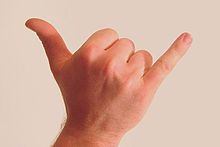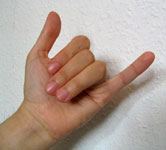Shaka sign

The shaka sign, sometimes known as "hang loose" is a gesture with friendly intent often associated with Hawaii and surf culture. It consists of extending the thumb and smallest finger while holding the three middle fingers curled, and gesturing in salutation while presenting the front or back of the hand; the wrist may be rotated back and forth for emphasis. The shaka sign is similar to the letter Y in the American manual alphabet in American Sign Language or the sign for number six in the Chinese hand counting symbol. The shaka sign should not be confused with the sign of the horns, where the index and pinky fingers are extended and the thumb holds down the middle two fingers.
Origins
According to the Honolulu Star-Bulletin,[1] prevailing local lore credits the gesture to Hamana Kalili of Laie,[2] who lost the three middle fingers of his right hand while working at the Kahuku Sugar Mill.[3] Kalili was then shifted to guarding the sugar train, and his all-clear wave of thumb and pinkie is said to have evolved into the shaka as children imitated the gesture.[4][5][6][7][8]
Another theory relates the origin of the shaka to the Spanish immigrants, who folded their middle fingers and took their thumbs to their lips as a friendly gesture to represent sharing a drink with the natives they met in Hawaii.[9][10][11][12][13]
The late Lippy Espinda, a used car salesman and Oahu-based entertainer, has also been named as a possible creator of the shaka.[14][15] Espinda, who frequently appeared as an extra in Hawaii Five-O as well as The Brady Bunch episodes shot in Hawaii, used the term and the sign during his television ads in the '60s. Though the claim that he is the originator of the shaka sign is debatable, he is credited with increasing its popularity and that of Hawaiian Pidgin as well.[1]
The word shaka is also used as an interjection expressing approval, which may predate its use for the shaka sign. According to the Oxford English Dictionary the origin of the word is uncertain, but it may come from Japanese, where it is a byname for the Buddha.[16]
Meaning and use

Residents of Hawaii use the shaka to convey the "Aloha Spirit", a concept of friendship, understanding, compassion, and solidarity among the various ethnic cultures that reside in Hawaii, lacking a direct semantic to literal translation. Drivers will often use it on the road to communicate distant greetings along with gratitude.[citation needed] A bill making it the state's official gesture passed the legislature in 2024.[3]

In the Honolulu public transport system (TheBus and Skyline), HOLO card readers display the shaka sign (along with a ukulele tone) when a card is tapped.[17]
In Hawaii, the shaka sign is known as "hang loose" and is popular in surfer culture.[3]
There are several emoticon representations of the shaka sign, including \,,,/, \m/, and \,,,_. The earliest known use of the first two, with three commas or a lower case "m" corresponding to a hand's three middle fingers, is from 2006.[18] The last, similar to the first except that it represents the thumb extended horizontally (as if perpendicular to the wrist) is reported, together with the first form, from Brigham Young University in 2016.[19]
Similar gestures
Chinese number gestures

The sign has some similarities to the Chinese number gesture for "six".
Beverages
The sign can also be used to indicate the imbibing of a bottled drink, either alcoholic or non-alcoholic, as attested to below, by placing the thumb to the mouth and motioning the little finger upward as if tipping up a bottle's bottom end. A similar meaning can be achieved by pressing the thumb up against the tip of the nose with the little finger raised upwards parallel to the bridge of the nose. It is referred to as "schooies" in Australia (Australian slang for a schooner)[20][21]
Telecommunications

With the thumb held near the ear and the little finger pointed at the mouth, the gesture is commonly understood to mimic the handset of a traditional landline telephone, and depending on context can be understood to stand for "call me", "I'll call you", or "let's talk on the phone".
The Unicode 9.0 emoji 🤙 "Call me hand"[22] can be interpreted as the shaka sign.
New Zealand
In New Zealand, the shaka sign is a gang salute for the Mongrel Mob, but is not commonly used for this purpose.[23] It can also serve as a greeting, meaning "Chur", which is a friendly gesture between friends, similar to in Hawaii where it is used in the same context.
Austrian Leiwand
A similar gesture was common among criminals in Vienna in 1935, accompanying the word of approval or appreciation "Leiwand".[24]
Usage examples
Since 2015, fans of Brigham Young University (which has a satellite campus in Hawai'i and is also known colloquially as "the Y") have started using the gesture, in deference to newly hired Kalani Sitake, BYU's Polynesian head football coach, and because of its similarity with the letter Y in the American manual alphabet in American Sign Language. It is also used as a nod of respect to Hamana Kalili, a native Hawaiian Latter-day Saint who, according to locals, is the founder of the popular sign.[19]
In 2024, Filipino P-pop girl group BINI which initially coined by one of its members Sheena through her catchy phrase, "Eyyy ka muna, eyyy," with a matching hand gesture has taken the internet by storm.[25]
See also
References
- ^ a b Watanabe, June (31 March 2002). "Wherever it came from, shaka sign part of Hawaii". Honolulu Star-Bulletin. Retrieved 13 January 2011.
- ^ "Honoring the Founder of the Shaka Hamana Kalili". This Week Hawaii. 16 June 2017.
- ^ a b c Yang, Maya (9 May 2024). "Talk to the hand: Hawaii makes shaka state's official gesture". Hawaii. The Guardian. ISSN 1756-3224. OCLC 60623878. Retrieved 9 May 2024.
- ^ "The Shaka". Polynesian Cultural Center. Archived from the original on 22 June 2011. Retrieved 13 January 2011.
- ^ "The history of the famous surfing shaka sign". SurferToday.
- ^ "Press Release: Polynesian Cultural Center's New Hukilau Marketplace Brings Back the Spirit of Old Laie". Archived from the original on 27 August 2017. Retrieved 27 August 2017.
- ^ Dylan Heyden (15 June 2016). "Everything You Wanted to Know About the History of the Shaka". The Inertia.
- ^ Joe Kukura (30 July 2015). "How Four Small-Town Oahu Natives Went on to Change the World". Polynesian Cultural Center.
- ^ Bob Krauss (25 September 2005). "Theorizing about birth of shaka". The Honolulu Advertiser.
- ^ "World-Famous Shaka Started By Hawaiian Latter-day Saint".
- ^ "The Origin of the "Shaka" Sign". Archived from the original on 22 February 2003.
- ^ Sean Reavis (18 March 2016). "The Shaka- History of the Hawaiian "Hang Loose"". Boarders. Archived from the original on 25 March 2016.
- ^ Céline Nguyen. "SURFIN' USA". Surf Library. See Appendix.
- ^ "The Funniest People in Hawaii". Honolulu Magazine. Retrieved 26 December 2014.
- ^ "Theorizing about birth of shaka". The Honolulu Advertiser. Retrieved 26 December 2014.
- ^ Martin, Katherine Connor (December 2016). "Release notes: Bama and shaka: how two local words went global". oed.com. Archived from the original on 24 June 2018. Retrieved 8 February 2021.
- ^ Stephenson, Anna (14 June 2021). "Breaking down how to use TheBus' new HOLO card as it transitions away from paper passes". Ke Alaka'i. Retrieved 21 July 2024.
- ^ Geal, Alan (1 October 2006). "Aux armes · mottoes: clarere audere gaudere & ζητεῖν τὴν ἀλήθειαν". Pleiade.org. Retrieved 2 July 2016.
an innocently hedonistic call of American West Coast youth in the 1960s, Surf's up! : \,,,/ or \m/ Hang loose!
- ^ a b Walker, Michael R. (Summer 2016). "World-Famous Shaka Started by Hawaiian Latter-day Saint". BYU Magazine. Retrieved 10 August 2016.
- ^ "Schooie". Slang Dictionary. Archived from the original on 10 October 2017. Retrieved 25 July 2016.
Australian Slang: schooner of beer
- ^ "Definition of Schooie". Babylon. Retrieved 25 July 2016.
Australian Slang: schooner of beer
- ^ "U+1F919: CALL ME HAND" (PDF). unicode.org.
- ^ Newbold, Greg; Taonui, Rāwiri (12 November 2012). "Gangs – Māori gangs and Pacific youth gangs". Te Ara – The Encyclopedia of New Zealand.
- ^ "Ein Beitrag zur Sprache des Wiener Verbrechertums". Öffentliche Sicherheit. 15 (8): 32. 1935.
- ^ ABS-CBN News (31 July 2024). ‘Eyyy ka muna’ trend pinauso ni BINI Sheena | Patrol ng Pilipino. Retrieved 24 November 2024 – via YouTube.
External links
 Media related to Shaka sign at Wikimedia Commons
Media related to Shaka sign at Wikimedia Commons
